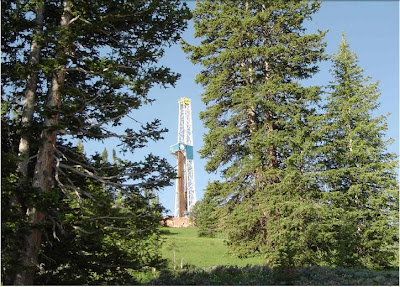New leases on life
 Ironies of ironies. Have the environmentalists/conservationists/protesters shifted their efforts towards land-based and offshore wind farms?
Ironies of ironies. Have the environmentalists/conservationists/protesters shifted their efforts towards land-based and offshore wind farms?It sure feels like it at times. (GW)
Protests of onshore leases down significantly in 2011
Phil Taylor
Greenwire
August 3, 2011
The Interior Department is facing far fewer environmental protests of oil and gas leases on public lands in 2011 than in the previous several years, according to recent data obtained by Greenwire.
The decline comes as the Bureau of Land Management implements a suite of reforms designed to increase oversight of the impacts of leasing and give the public a greater role in environmental reviews.
The reforms, while criticized by industry and some Western lawmakers who argue they will result in delays and a net decrease in leases, will provide greater certainty to developers that leases sold will be issued on time, said BLM Director Bob Abbey.
"I am very pleased with the early results of our leasing reforms," Abbey told Greenwire after a House hearing in late July. "We're seeing less protests on the number of parcels we're offering, and I think it's because of the amount of work we're doing in analyzing these parcels prior to offering them up for lease."
Protests were filed on 8 percent of the 786 parcels BLM has proposed for oil and gas leasing from January through the end of July, down significantly from an average of 36 percent over the past six years, according to BLM data. But the agency is on pace to issue fewer lease parcels this year than any of the past six years, according to separate data from BLM.
The leasing reforms, which were scheduled to be fully implemented in May, give stakeholders more time to evaluate parcels before they are offered for sale and encourage BLM to conduct site-specific reviews of parcels that could harm sensitive lands. The reforms also seek to overhaul BLM's use of categorical exclusions, which allow the agency to shortcut environmental reviews for low-impact projects.
That policy faces a legal challenge from the Denver-based Western Energy Alliance (WEA) in the U.S. District Court for the District of Wyoming, which is scheduled to hear arguments Aug. 12.
Kathleen Sgamma, WEA's director of government and public affairs, said that she is not surprised the number of protests have gone down considering BLM is putting fewer leases up for sale.
"Now that we're seeing BLM not offer anything with the least bit of controversy, no wonder protests have gone down," she said. "When you don't offer much, there's not much to protest, is there?"
Abbey said the leasing reforms -- and a continued decline in protests -- will help the agency comply with a May ruling by the court that found the agency has violated the Mineral Leasing Act by failing to issue leases within 60 days of their sale at auction to the top qualified bidders (Greenwire, May 30).
The decision by U.S. District Judge Nancy Freudenthal was in response to a WEA complaint that BLM had failed to issue 118 leases that had been sold between 2002 and 2005. BLM tries to resolve environmental protests before issuing leases.
But the protests are blamed for delaying the issuance of roughly 1,500 oil and gas leases in Wyoming in recent years, stranding some $100 million in capital investment and stifling domestic energy development, industry has argued.
A Government Accountability Office report last fall found that BLM took too long to resolve more than 90 percent of the protests filed against oil and gas leases in four Western states but that the delays did not appear to affect the price companies were willing to pay for the leases (Land Letter, Sept. 9, 2010).
"One of the primary motivations of going forward with the leasing reforms was to try to never find ourselves in this kind of situation again, where areas are actually leased and then are precluded from moving forward," Abbey said.
Abbey said BLM has offered to reimburse the companies affected in the WEA case and would comply with Freudenthal's deadline for issuing a decision on the leases.
But the leasing reforms continue to draw the scrutiny of Western Republican lawmakers who have recently accused them of locking up access to public lands at a time of high unemployment and decreasing government revenue.
In a July letter to Interior Secretary Ken Salazar, the lawmakers argued that BLM's newly proposed "master leasing plans" for oil and gas in Utah, Colorado, Wyoming and Montana are being used to obstruct responsible exploration and that the existing land-use planning process is adequate to protect wildlife and other users.
"The administration's MLP process has cut out public input and created a duplicative review targeting only oil and natural gas," said the letter signed by Republican Sens. John Barrasso and Mike Enzi of Wyoming, Mike Lee and Orrin Hatch of Utah, and John Hoeven of North Dakota as well as Rep. Rob Bishop of Utah.
"We are also concerned that the MLP policy will further restrict our nation's ability to develop its natural resources at a time when oil sits near $100 per barrel and energy prices continue to weigh down our fragile economic recovery," the lawmakers said.
The Wilderness Society blasted the letter, arguing that industry currently has more than 6,500 drilling permits that remain unused. The group pointed to an Interior report that found the oil and gas industry has yet to develop 57 percent of its current onshore leases.
"They've got tens of millions of acres on the shelf," said Dave Alberswerth, senior policy adviser for the Wilderness Society. "BLM is taking a closer look before jumping into leasing."


0 Comments:
Post a Comment
<< Home